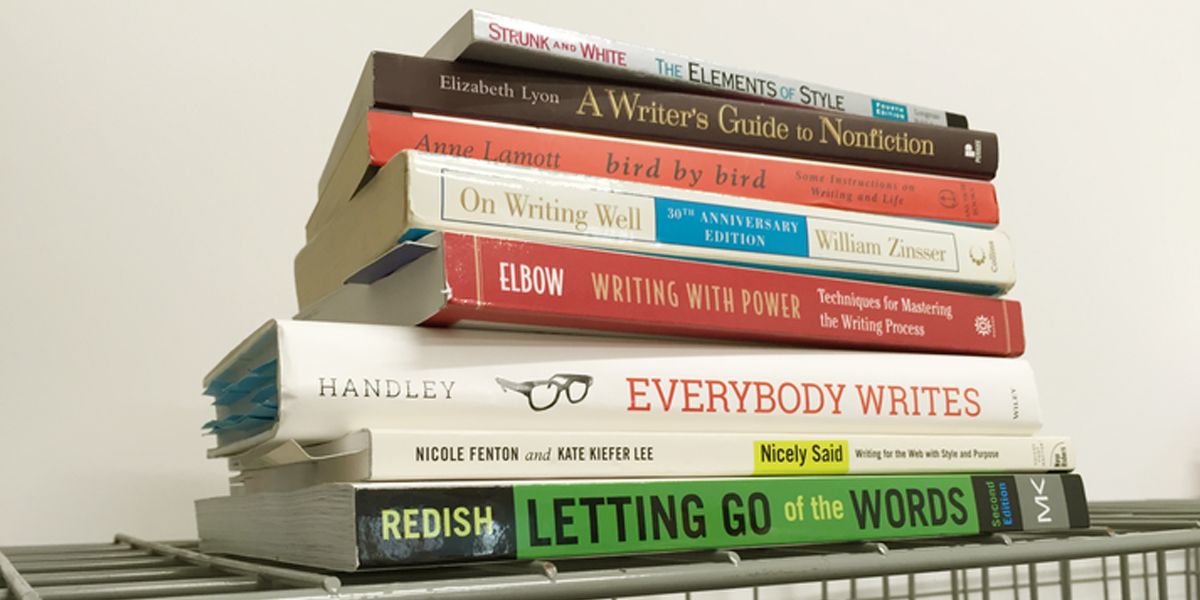
MailChimp originally published this article in issue 34 of their UX newsletter.
To become a better writer, Center Centre’s facilitator, Jessica Ivins, is reading books and working with a writing coach.
A learning-centered culture
At Center Centre, it’s okay to admit that you don’t know how to do something. It’s not just okay—it’s encouraged. No one holds it against you if you don’t have a solution to a problem or an answer to a question. Instead, we rally to support each other in our learning.
Center Centre is the user experience design school creating the next generation of industry-ready UX designers. Learning is at the center of everything we do. We’re not only a place of learning; we have a learning-centered culture.
When I first started working at Center Centre as a facilitator (full-time faculty), I told Dr. Leslie Jensen-Inman, Center Centre’s co-founder and institutional director, that I wanted to improve my writing. She was completely supportive of this goal. She asked me how I learn best.
I learn best by reading books. Together, Leslie and I made a plan and we figured out what books were best for me to read. I started with On Writing Well, as well as Everybody Writes, Nicely Said, and The Elements of Style.
While reading these books, Leslie worked with me as a writing coach. She reviewed my writing and made edits when necessary. Her feedback was honest and consistent. She pointed out what worked well and what didn’t. When I was stuck, she encouraged me to persevere, and she shared more writing resources.
By reading books about writing, by writing, and by working with a coach, I learned things about writing that I never learned in grade school or college. For example, I learned when to write with active voice, not passive voice. I learned techniques to get past hurdles like writer’s block.
Leslie and I worked together on writing for about five months. At the end of five months, my writing was significantly better. I even developed my editing skills to the point where I’m able to help Leslie write stronger content. We continue working together on writing. Learning is an ongoing process.
Ways to learn new skills
At previous jobs, I didn’t have many opportunities to learn new things as part of my work responsibilities. I had to work a certain number of billable hours, and I had to focus on client deliverables. At Center Centre, learning how to learn, and making the time to learn, are at the core of what we do. I’m grateful for the time I have to learn because professional development is critical to user experience.
As UX practitioners, we’re always learning new things. Technology constantly changes, as do user needs and behaviors. We must adapt to these changes by learning new techniques, tools, and methods for our work.
Lobby your boss
A former boss once told me, "It’s our job to keep up with the industry outside of work hours." I understand why he would say that. From 9 to 5, we have a lot of work tasks to accomplish. As a manager, it’s his job to ensure these tasks get done.
I wish I could go back in time to continue that conversation. Investing time in learning a new skill now transforms you into a more effective team member in the future.
It took me about five months to improve my writing. Because I invested time up front, I’m now able to communicate clearly and quickly. I’m able to express my thoughts more effectively to my colleagues, my boss, and anyone who wants to learn more about the school.
If you work at an organization like Center Centre, where learning is considered a part of your job and where your boss realizes the long-term value of professional development, take your boss up on opportunities to improve your UX practice. Learning a new skill or improving an existing skill can often fall off to a to-do list. Do your best to make learning a priority.
If you work at an organization that doesn’t allow for professional development during business hours, you may have to lobby your boss for time to learn. Perhaps learning something new is as simple as dedicating three lunch hours to learning every week. Maybe you can also devote three hours of your weekend. That’s a solid six hours of learning per week. Imagine what you can accomplish after six hours per week over the course of a year.
Keeping your boss up to date with what you’re learning, and how you’re applying it to your job, may help make the case for continued education. If your boss sees how learning something new with just a few hours a week helps the organization, it will be easier to get the time you need for learning.
Ask for help
Recently, I wanted to know the best way to learn about information architecture (IA). I was hesitant to ask for help. Imposter syndrome reared its ugly head. I felt vulnerable, and I didn’t want to look incompetent. I thought to myself, "I’ve been in the field for 10 years. I should know this already."
Then, I remembered my experience of learning how to improve my writing: I had to ask for help to become a better writer. I told myself that it was okay to be vulnerable, and I had to be comfortable with asking for help. I reached out to accomplished UX practitioners like Christina Wodtke, Lou Rosenfeld, and Abby Covert. To my relief, these folks and others made lots of recommendations, and I’m now up to my ears on books about Information Architecture.
Asking for help is the first step toward learning something new. Without recommendations from the UX community, I may have wasted time on books or resources that weren’t what I needed.
Find someone who has experience doing what you want to learn. Ask that person to help you meet your learning goals.
You might think, "Everyone’s busy, and no one has time to help me learn." Coaching, however, doesn’t have to take a lot of time—it can take five minutes a day or five minutes a week. The UX community has a lot of smart and kind people who are willing to help you achieve your goals.
Lifelong learning
Learning how to write taught me how to become a better learner. By learning how to learn—and by being open about my process—I’m modeling the behavior of a lifelong learner for Center Centre’s students.
When our students graduate, I don’t want them just to be proficient in UX. I want them to be confident in their ability to learn. By knowing how to learn, our students will be an asset to hiring managers from day one. In the meantime, I look forward to experiencing the process of lifelong learning with Center Centre students.

